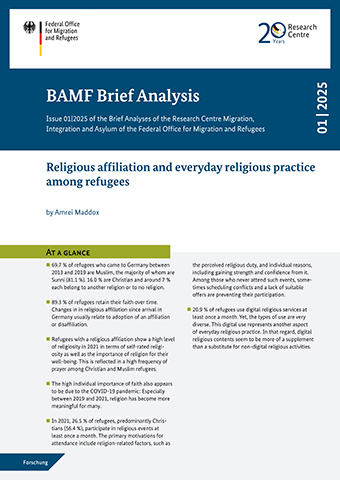Religious affiliation and everyday religious practice among refugees ,
 Source: © BAMF
Source: © BAMF
The BAMF Brief Analysis 1|2025 provides an overview of the religious affiliation, religiosity, and everyday religious practices of refugees who came to Germany between 2013 and 2019.
The report is part of the project "Analyses of Religion in the Migration Context" (AReMi). The analyses are based on data from the IAB-BAMF-SOEP Survey of Refugees from 2021. They examine the importance of religion in the lives of refugees as well as the extent and manner in which they practise their faith. A special focus is put on the participation in religious events, including personal reasons for attending or not attending. It also considers the use of digital religious content and services. The report further looks at changes in religious characteristics over time while also addressing the impact of the COVID-19 pandemic. To do so, data on the same individuals from previous years are used in addition.
Key findings
Refugees are predominantly religious and actively practice their faith
The clear majority of refugees belong to a religion in 2021, mainly Islam. The majority of those with a religious affiliation describe themselves as devout, and their faith tends to have a high priority in their lives. For both Christians and Muslims, this pronounced religiosity is also reflected in a high frequency of prayer, but not in attendance of religious events. Christian refugees take part in religious events significantly more often than members of non-Christian religions.
Time conflicts and unsuitable options sometimes stand in the way of attending religious events
The reasons for or against attending religious events can be very diverse. In Islam, for example, attending a mosque is a religious obligation only for men. Refugees who belong to a religion but do not attend religious events cite, besides other, not further specified reasons, in particular time constraints and a lack of suitable offers. For some, participation in religious events is not important for practising their faith. Refugees who belong to a religion and attend religious events at least occasionally do so mainly for religious reasons, e.g. out of religious duty, or for individual reasons, e.g. because attending religious events provides them with strength and confidence.
Use of digital religious content as another aspect of everyday religious practice
For the first time, the IAB-BAMF-SOEP Survey of Refugees also covered the use of digital religious content and services as a further aspect of everyday religious practice. Approximately one in five people access of such resources at least once a month, with a wide variety of uses. The analyses also show that digital religious content is mostly used in addition to non-digital religious activities, rather than as substitute when missing suitable religious events.
The Brief Analysis was written by Dr. Amrei Maddox.
This download is available in other languages, too.
Citation
Maddox, A. (2025). Religious affiliation and everyday religious practice among refugees (BAMF Brief Analysis 01|2025). Nuremberg. Federal Office for Migration and Refugees.
https://doi.org/10.48570/bamf.fz.ka.01/2025.en.2025.religion.1.0

